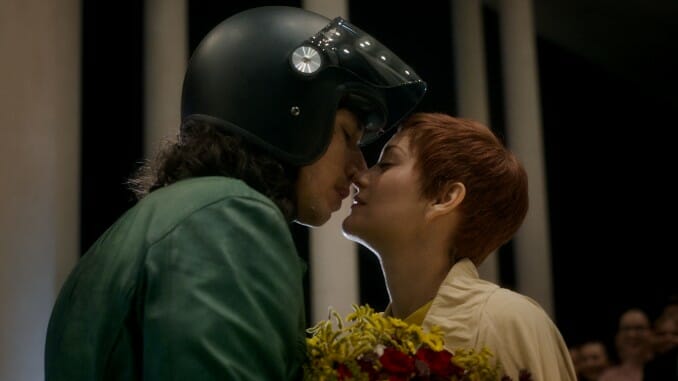Annette‘s Opera of Irony and Ecstasy Takes a Wild, Whiffing Swing

It’s not hard to understand why Annette attracted those it did. It’s challenging and intense and silly and standoffish, exciting for performers tired of the same ol’ thing and filmmakers who’ve never even heard of it. With a script and music by rock-rascals Sparks (Russell and Ron Mael), and with the unmistakable Leos Carax directing the production, the musical requires adventurous acting from Adam Driver and Marion Cotillard as they play out the winking, provocative entertainment industry popera. What’s a little harder to parse is if there’s as much lurking beneath the surface-level art-snark as its performers valiantly ask us to believe. Sometimes, I was hypnotized by their audacity and ready to follow them anywhere. Sometimes, I was ready to nod off or head out. Annette contains all these things—moments of brilliance, intriguingly odd choices, vapidly odd choices and colossal, wild, whiffing swings—as it struggles to make sense of and goof upon a self-involved life of artistry.
Naturally, the film itself is extremely self-conscious. Not only do the Maels pop up in every other scene—checking in on us to see how we’re doing like a significant other glancing over at your face when they’re showing you a favorite film—but we’re explicitly welcomed to and bid farewell from the movie by cast and crew alike. Unfortunately, it kicks off with its best song. As the love between confrontational stand-up Henry McHenry (Driver) and soprano Ann Defrasnoux (Cotillard) goes down its surreal rabbit holes, the songs are slight, repetitive and—worst of all—none as funny or catchy as its opening hook. The thrumming “So May We Start” never finds a musical or lyrical match to its self-effacing charm (“The authors are here so let’s not show disdain / The authors are here and they’re a little vain”), as songs like “We Love Each Other So Much” are quick to wear out their hyper-literal gag. A song where McHenry takes a small breather from eating out his wife to sing the chorus for a second, only for priorities to take back over, gets on your nerves when it should be the capping joke making an erotic, sweaty sex scene all the more enjoyable.
Like the rest of Annette, the dry humor isn’t funny enough to fully sustain its cool-kid commentary and the filmmaking is never grand enough to fully sell the caricature. The title conceit is one of the few places this complex tone clicks into place: From McHenry and Defrasnoux’s romance springs their daughter, a puppet mari-Annette with a voice of gold. I liked the fragile craft of La Pendue’s endearing little moppet, which almost looks like a Team America version of Denis Lavant’s Holy Motors sewer goblin Monsieur Merde (which, knowing Carax, could be yet another joke), but the melodrama she’s counterbalancing never quite moves us one way or the other.
Befitting a relationship starting with so many loving affirmations, the family is in for an equitable amount of tragedy. Fleeting visions of controversy and waves of jealousy, told through entertainingly chipper paparazzi storybook interludes. But, like much of the actual plot and far too many of the most aesthetically interesting scenes, interludes are all they are. That’s just how things go in showbiz (and in Annette’s showy biz). These extremes of emotion—gesturing towards the kind of bright primary emotional colors put on display in performance art, opera and, yes, insult comedy—attempt to sweep in with the gaudy strings and plainly descriptive lyrics, but only occasionally find success when Carax fully gives into long takes and production design that pulls expressionistic wonders from mundane locales. One of Annette’s best numbers is one that most earnestly uses its theatrical staging, zooming around a courtroom and playing with reflection, costume and setting with more control and flair than some of its more elaborate tracking shots or heightened situations. Why the rest of the film couldn’t be equally engrossing—as Carax has proven himself capable of incredible craft here and elsewhere in his career—seems like an unintentional part of its push-pull relationship with the audience. The script is caught up in playing with what we expect from an epic, weird musical but neglects to meaningfully tie what should be a spiraling nightmare to anything affecting. It’s just as good at boring us as it is at disarming or amusing us.
-

-

-

-

-

-

-

-

-

-

-

-

-

-

-

-

-

-

-

-

-

-

-

-

-

-

-

-

-

-

-

-

-

-

-

-

-

-

-

-








































